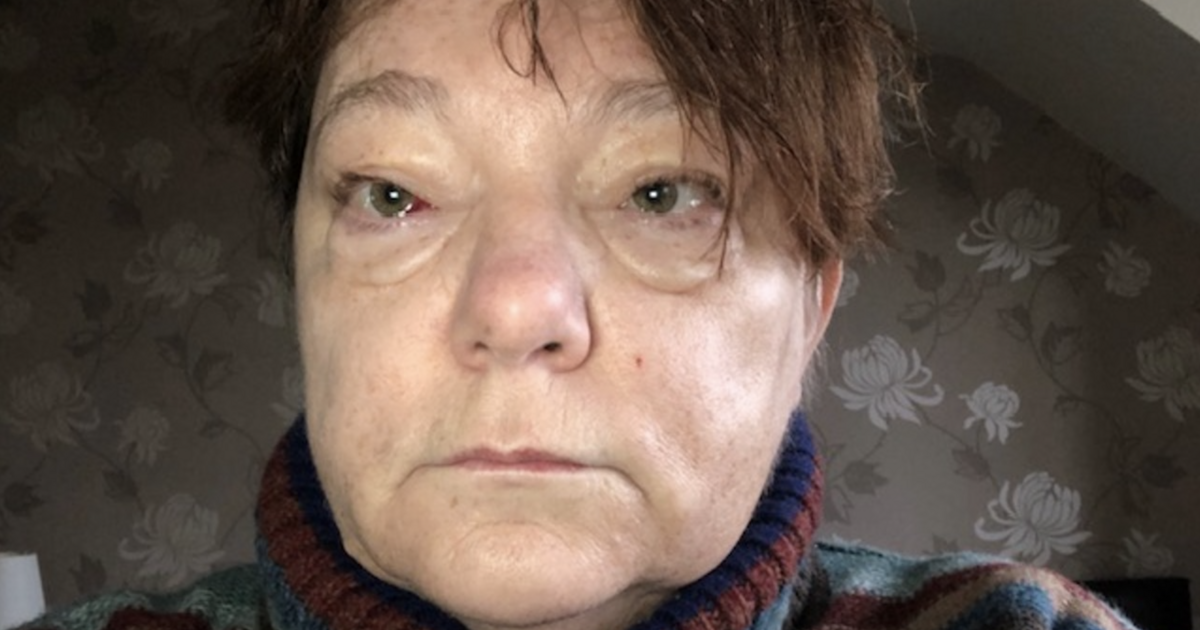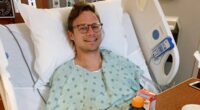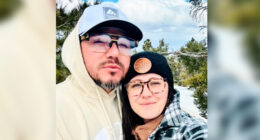When her daughter suggested she visit her doctor to talk about the bags she had developed under her eyes, Lizzie Spear worried she would be accused of wasting the GP’s time.
“My daughter Lowri had said, ‘Mum, I think you need to go and see the GP because you don’t look very well’,” recalls Lizzie. “The bags under my eyes were ridiculously large, which I put down to tiredness as I wasn’t sleeping well. I actually told Lowri that I wasn’t going to waste the doctor’s time with a cosmetic issue, but she convinced me to go.”
In February 2021, Lizzie reluctantly went for an appointment where she underwent routine blood tests. She was shocked when the results came back a day later flagging up an abnormality and told to go urgently to hospital for a bone marrow biopsy.
“I wasn’t expecting that and instantly knew this wasn’t good news,” says Lizzie, a professional cellist and teacher.
When the 56-year-old from near Uttoxeter, in Staffordshire, arrived at the hospital with her fiance John, the news got worse. “I was told there was now no need for a biopsy as my blood tests showed I had leukaemia and it was just a case of narrowing down which type,” she says.
“I felt numb. Only a few days earlier I had to be convinced to go to the GP and now I’d been diagnosed with blood cancer.”
Lizzie was diagnosed with acute lymphoblastic leukaemia (ALL). There are fewer than 800 new cases in the UK annually, and it’s more common in children than adults.
One of the symptoms is extreme tiredness, which doctors think possibly explained the puffy bags under her eyes. Lizzie spent eight weeks undergoing treatment at Nottingham City Hospital, where she was given an intense course of chemotherapy, which required drugs to be injected directly into the fluid around her spinal cord.
Unfortunately, the gruelling two months of treatment failed to put her ALL into remission, so she was prescribed a course of immunotherapy before doctors revealed she needed a stem cell transplant to replace the damaged blood cells with healthy ones.
As an only child, Lizzie didn’t have a sibling to help, which meant her only child, Lowri, who was 21 and studying at university, was the obvious choice. “The doctors said Lowri was a half match and, given the severity of my situation, it was our best hope,” says Lizzie. “She was brilliant and said she would do whatever she could to help.”
In September 2021, stem cells were harvested from Lowri via a tube into her femoral artery in the groin. The next morning they were infused into Lizzie’s arm, before weekly tests monitored the new cells weren’t being rejected. Six months later, a top-up of more stem cells from Lowri followed.
For a long time, things looked positive and the family thought Lizzie’s health worries might be behind them, but in November 2023 she was given the devastating news that her leukaemia had returned.
“I was totally flabbergasted,” says Lizzie. “I’d just come back from a lovely holiday and although I was feeling quite fatigued, I assumed that was due to my earlier treatment.
“I was told it would be pointless for Lowri to donate again. But then my consultant said, ‘You’re in luck, there’s a new treatment called CAR-T cell therapy’.
“It wasn’t simple though as you have to be approved by the NHS Cancer Drugs Fund panel and there’s no guarantee they will, as one infusion costs £500,000.”
CAR-T therapy involves a patient’s own immune system cells (T-cells) being modified in a lab so they can attach and then kill cancer cells once they have been returned to the bloodstream. Evidence has shown it’s effective against ALL and can extend survival rates.
Continuing with chemotherapy while waiting for a decision, Lizzie’s health deteriorated. A reaction to her particular chemotherapy treatment led to a temporary loss of sight in her right eye and she began to rely on a wheelchair after losing sensation in her legs and struggled to stay awake.
“I knew that if I didn’t have the CAR-T I would die, so it was my only option,” says Lizzie.
“As it’s so expensive, I would not get a second go. The wait for the panel to decide was agonising.” Then, last February approval came, making Lizzie one of the few in the UK – and the first at the Nottingham Hospital – to receive it for relapsed ALL. It’s estimated that about 90 people in England with this cancer could now benefit.
“The actual drug came in what looked like a DVD case and took about three hours to be infused,” says Lizzie, who received confirmation of its success last August – her cancer was in remission.
“After it had worked, I had a T-shirt made showing me as the guinea pig because that’s what I had been. I’m hugely grateful to the NHS,” she adds.
Although still suffering with side-effects, including nerve damage to her spinal cord which means she walks with a stick, Lizzie is back to playing gigs with her cello and travelling.
“I’m so grateful Lowri spotted those bags under my eyes and made me see my GP,” says Lizzie, who is doing a fund- raising walk for Leukaemia UK with her dog Scout.
■ For more details about the life-saving research funded by Leukaemia UK, visit leukaemiauk.org.uk. You can find Lizzie Spear’s fundraising page on justgiving.com.









